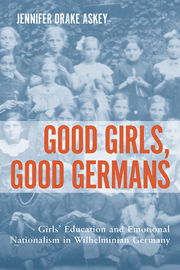Book contents
- Frontmatter
- Dedication
- Contents
- Acknowledgments
- Introduction: Emotional Nationalism and Germany’s Daughters
- 1 Nationalist Education and Prussia's höhere Töchter
- 2 Father's Library: German Classics in Girls' Schools and the Ownership of German Culture
- 3 Mädchenliteratur I—Backfischbücher and Historical Novels
- 4 Mädchenliteratur II—Queen Luise
- Conclusion
- Bibliography
- Index
Introduction: Emotional Nationalism and Germany’s Daughters
Published online by Cambridge University Press: 05 August 2013
- Frontmatter
- Dedication
- Contents
- Acknowledgments
- Introduction: Emotional Nationalism and Germany’s Daughters
- 1 Nationalist Education and Prussia's höhere Töchter
- 2 Father's Library: German Classics in Girls' Schools and the Ownership of German Culture
- 3 Mädchenliteratur I—Backfischbücher and Historical Novels
- 4 Mädchenliteratur II—Queen Luise
- Conclusion
- Bibliography
- Index
Summary
The protagonist of Gabriele Reuter's 1895 novel Aus guter Familie (From a Good Family, 1999), Agathe Heidling, receives two books for her religious confirmation, and the reactions of Agathe's family and that of her pastor to these gifts reveal much about the landscape of gender and nationalism in which Agathe, a typical upper-middle-class girl, lived and was educated. Her cousin Martin gives her Georg Herwegh's Gedichte eines Lebendigen (Poems of one who is alive) and her friend Eugenie presents her with Friedrich Rückert's Liebesfrühling (Springtime of love). Her pastor and her father are visibly dismayed at the revolutionary political nature of Herwegh's poems and take the volume away from her, to replace it later with a volume on pressing flowers (12). Pastor Kandler summarizes the men's opinions of the book and Agathe's relationship to it and others of its kind by saying: “There are so many lovely poems that are more appropriate for a young girl and that you'll like better” (23). Without explaining the significance of her transgression or Martin's, her male authority figures shame and punish her into disavowing the appeal that this literature had for her and turn her attention instead to more appropriate texts, such as Gerok's Palmenblätter (Palm leaves), and a volume titled Das Weib als Jungfrau, Gattin und Mutter (The woman as maiden, wife, and mother). These works, also confirmation gifts, place Agathe solidly within her culture's dominant discourse on femininity, where her position in society and her sense of self is determined by her relationships—romantic and otherwise—to her father and her unknown, future husband.
- Type
- Chapter
- Information
- Good Girls, Good GermansGirls' Education and Emotional Nationalism in Wilhelminian Germany, pp. 1 - 28Publisher: Boydell & BrewerPrint publication year: 2013



